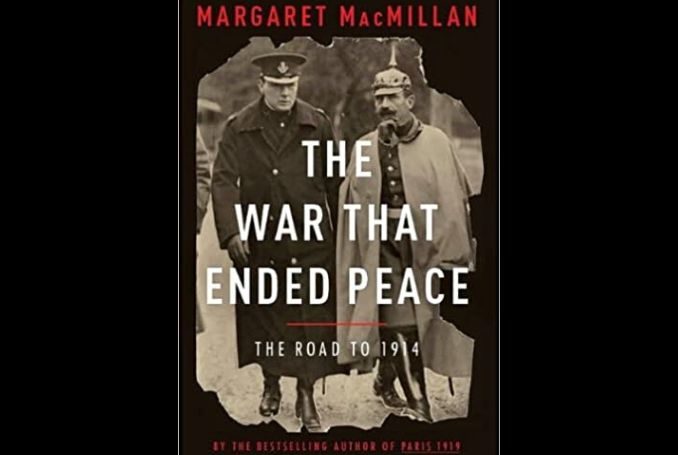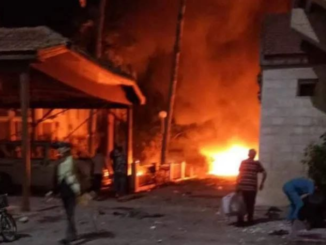
By Jim Miles
On a recent hiking trip I took along Margaret MacMillan’s pre World War I history, “The War That Ended Peace – The Road to 1914” (Penguin Canada, 2013). It is a well-written history that I have read before – and may have formally reviewed although that is not of consequence now. It is a book I highly recommend as it flows smoothly and delves into the personalities and mindsets of the various people involved in making the fatal decisions leading up to the war.
What struck me on this second reading was my own comparison of that era to our current global situation. Obviously there are differences: the technology of war, the communications, the armaments are vastly more powerful and faster than before; the global political scene has shifted from a bunch of empires thrashing out their spheres of influence to one empire attempting to retain hegemony while other polarities rise; and the center of the conflict’s origins has shifted somewhat from the Balkans/Ottoman interface to its close southern neighbor, the Arab states and Israel and Iran (all of which were also involved in the first mess, but not central to it). A future conflict could arise elsewhere with the US belligerence chasing around the world, but the Middle East is probably the most serious contender with all its oil, the petrodollar, and Christian Zionism focussing into that region.
The comparison of similarities has more to do with global mindsets rather than the details of specific events. The first phrase that struck me was,
“The old liberal parties which stood for free markets, the rule of law, and human rights for all were losing ground to socialist parties on the left, and increasingly chauvinistic parties on the right. A new breed of politicians was going outside established parliamentary institutions to appeal to popular fears and prejudices and their populism, especially among the nationalist parties….[p. 266]”
Now, truly understood, free markets, rule of law, and human rights for all are not all that they seem to be as they mask many attributes of imperial desires – but that was just as true then as it is today. The specifics that jumped to mind are Trump in all his aspects, Boris Johnson and Brexit (and probably more domestic shenanigans that I have not followed), and many of the East European nations falling under the veil of NATO, with Poland in particular fawning to the empire’s desires. Ukraine has gone to the nationalist party neo-Nazi side of things with great support from Canada and the US The key here is the US with Trump’s all too transparent manipulations of his adherents and his pushing off and denial of anyone who upsets his delicate ego.
Speaking of the U.S, the next phrase that caught my attention in the general sense concerned the military,
“Militarism, the arms race, an aggressive foreign policy, and imperialism were all seen as interrelated evils which needed to be tackled if there were to be lasting peace.[p. 297]”
Just as it was true then, the statement also provides a clear representation of what the “peace movement” holds true today. The unfortunate aspect of this is the seeming lack of an actual peace movement today – its last gasp did nothing to prevent the lies of business, politicians, and militarists (corporate and government) from invading Iraq, and on into Libya and Syria.
A major part of today’s militarism is the navy. In its day Britannia ruled the waves,
“…[claiming] British sea power had always been a benevolent force for peace and progress, it is perhaps not surprising that the reaction from the Continent was one of cynicism and hostility.[p. 303]”
Today, the US navy claims the same thing, bringing peace and progress via its aircraft carrier task forces to such hot spots as the Persian Gulf, the South China Sea, and the Korean peninsula (among many other areas needing US protection for its corporations and petrodollar). Like all gunboat diplomacy, it deserves all the cynicism and hostility able to be directed at it without actually triggering the next war – and as I write that, it too was one of the crucial elements of pre World War I, trying not to trigger a war, but also wanting one if they thought they could make it look like the other guy’s fault.
But it goes beyond the gunboats and back to militarism in general,
“While the military and their plans did not by themselves cause the Great War, their infatuation with the offensive and their acceptance of war as both necessary and inevitable made them put pressure on those making the decisions…The military advice almost invariably tended towards war…the military drew up plans which turned out to limit…the choices before the decision-makers.[p.376]”
From the discussions I have read about US war plans and war intentions, this all seems true today as well, whether it be Wolfowitz’s plans for first-use nuclear strike or Bolton’s recent efforts to entice Iran or Russia or China into making a mistake that the US media can turn into a reason to attack. Fortunately, at least to some very small degree, these very countries are tending to focus on highly advanced defensive technologies as well as nuclear retaliatory capabilities that make the first strike a global suicide.
The media and public opinion also enter into the similarities, although the text does not delve into them in any great detail. Then as now, ‘public opinion’ is shaped to a large degree by the media, and the media, in turn, is generally shaped by those in power, either directly in control of the media, or by issuing statements intended to deceive and mislead the public and to stir up the necessary component of domestic nationalism. While it starts with ignorance,
“Too often, the civilians did not know, or did not care to inform themselves, about what the military was planning….[p. 324]”
It leads to “gusts of fear and heightened nationalism that ran through their own publics, and the lobby and special interest groups grew increasingly skilled in stirring up opinion.[p. 504]”
This is so true today with the media controlled by a few corporate owners and the psychology of mass misrepresentation well studied and very effective.
Finally, on a lesser note, at least for the historical record, MacMillan mentions in passing signals from the domestic local financial situation: stock market jitters, bank runs (no digital economy back then, real dollars counted), and hoarding of supplies (toilet paper anyone? Okay, a different topic, but it still speaks of mass delusion.)
Are times really much different? Technologically yes, but human nature remains the same, people are readily manipulated by the powers that be in order to find some other villain, rather than find fault with themselves, for the brinkmanship that could lead us to a third and final conflagration globally. There are enough similarities in the current political mindset of nations that we need to remind ourselves, educate ourselves, to the knowledge that militarism, corporate greed, and media manipulations keep the world on the brink of disaster.
Margaret MacMillan’s other work on World War I, “Paris 1919 – Six Months That Changed the World” (Random House, 2003) is an excellent followup to this volume and details how the politicians turned away from liberal democracy in order to revive or retain their empires, a new colonialism under League of Nations mandates.
– Jim Miles is a Canadian educator and a regular contributor/columnist of opinion pieces and book reviews to Palestine Chronicles. His interest in this topic stems originally from an environmental perspective, which encompasses the militarization and economic subjugation of the global community and its commodification by corporate governance and by the American government.

– Jim Miles is a Canadian educator and a regular contributor/columnist of opinion pieces and book reviews to Palestine Chronicles. His interest in this topic stems originally from an environmental perspective, which encompasses the militarization and economic subjugation of the global community and its commodification by corporate governance and by the American government.







